From celestial bodies to mythological deities associated with the sky, the universe offers a treasure trove of majestic and mystical monikers. Space cat names not only capture the enigmatic allure of the universe but also pays homage to the infinite curiosity and wonder that cats and the cosmos both evoke. Your love for your new cat is already out of this world–so let’s find a name that is just as stellar!
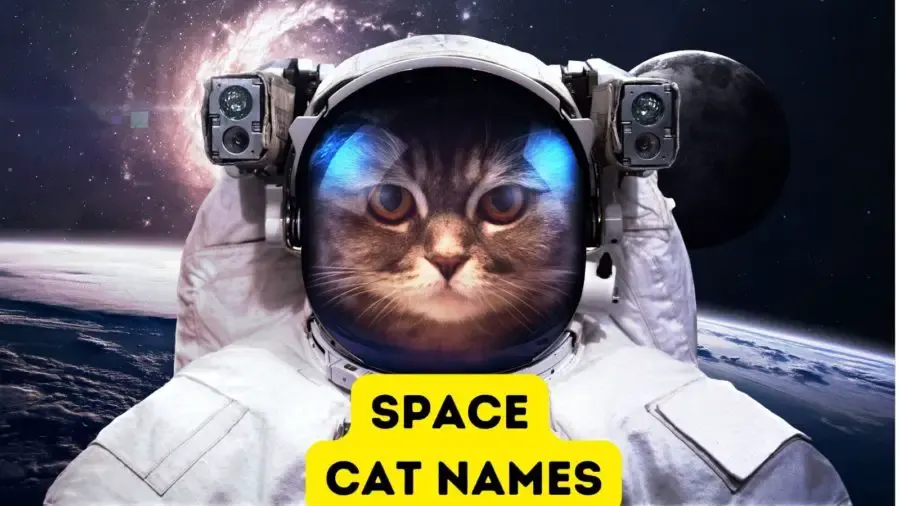
Cats in Space
As a testament to the creativity of filmmakers, cats have held roles in many space-themed movies, proving that the fascination with both space and cats is truly universal (get it?)
Caitians – A cat-like humanoid species in the Star Trek universe. While they primarily appear in the animated series, some background Caitians can be spotted in movies like Star Trek IV: The Voyage Home.
Cat Aliens – In the 2001 film Cats & Dogs, the primary antagonists are cats led by Mr. Tinkles. In the sequel, Cats & Dogs: The Revenge of Kitty Galore, Kitty Galore has plans that involve a satellite, space, and her goal to send out a signal that would drive all dogs insane.
Chesshire – In the 2010 film Space Dogs, Chesshire is a cat who is the antagonist. The film is an animated tale inspired by the true story of Belka and Strelka, two dogs sent to space by the Soviet Union.
Goose – Not a typical cat, but a Flerken, an alien species resembling Earth cats. Goose is Carol Danvers’ pet in the 2019 Marvel film Captain Marvel. The creature can store items in pocket dimensions and has tentacles that emerge from its mouth.
Jonesy (or Jones) – This ginger tomcat is the ship’s pet aboard the USCSS Nostromo in Ridley Scott’s 1979 film Alien. Jonesy witnesses the terror of the Xenomorph but manages to survive along with Ellen Ripley.
Lunar Cats – In the animated film Starship Troopers: Invasion (2012), there’s a scene where a team of troopers encounters a horde of monstrous, bio-luminescent “lunar cats” on an outpost.
Orion – In the 1997 film Men in Black, Orion is a cat that belongs to a recently assassinated alien disguised as a human. The cat plays a crucial role in the plot as it wears a galaxy-containing pendant around its neck.
Spot – Data’s pet cat in Star Trek: The Next Generation. While primarily a TV show, the crew of the USS Enterprise-D (including Spot) appeared in films like Star Trek: Generations and Star Trek: First Contact.
Thundercats – Originating from a popular 1980s animated series, these cat-humanoids from the dying planet Thundera also appeared in comics and a 2011 reboot series. While not strictly a space movie, their origin story involves space travel.
Baby Names Related to Space
There’s a growing trend to name our kitties with baby names so let’s look at some female, male and unisex names that draw inspiration from various aspects of space, galaxies, and celestial bodies, making them perfect for those with a love for the cosmos.
Girls:
- Alya – Arabic for “sky,” “heaven”
- Aludra – A star in the Canis Major constellation
- Astra – Latin origin meaning “star.”
- Astria – Derived from “astra,” meaning “star”
- Astrid – Norse origin meaning “divinely beautiful” or “God’s strength.”
- Aurora – The natural light displays in the sky, especially in the polar regions.
- Bellatrix – A star in the constellation Orion; means “female warrior“
- Calista – Derived from the Greek “kallisto,” meaning “most beautiful.” Associated with a celestial bear.
- Carina – A constellation in the southern sky
- Celeste – Latin origin meaning “heavenly.”
- Celestia – Derived from “celestial” meaning “heavenly”
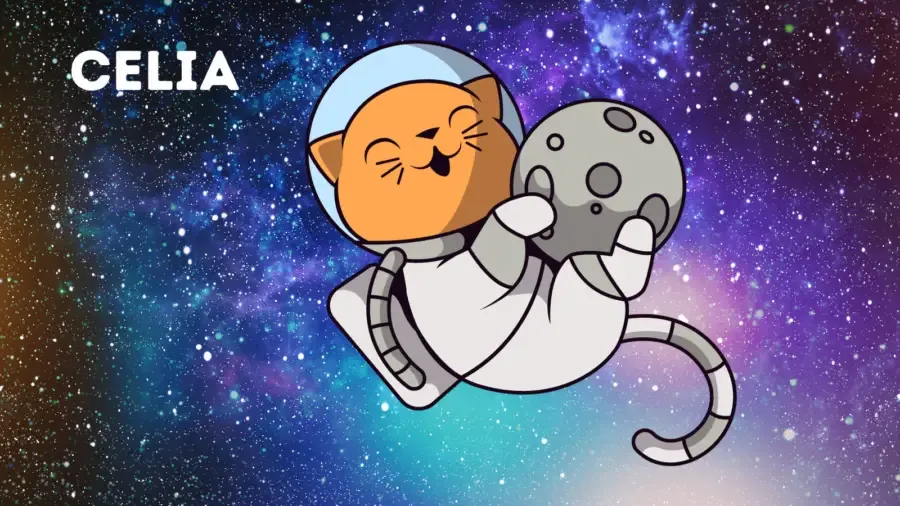
- Celia – Latin origin, meaning “heavenly”
- Celine – Derived from Latin “caelum,” meaning “heaven”
- Danica – Slavic origin meaning “morning star.”
- Estella – Variation of “Estelle”
- Estelle – French origin meaning “star.”
- Estrella – Spanish for “star”
- Esther – Persian origin meaning “star.”
- Galaxia – Derived from “galaxy”
- Hoshi – Japanese for “star”
- Ishtar – Babylonian goddess of love and war, associated with the planet Venus
- Juno – Roman goddess; also an asteroid belt
- Luna – Another name for the moon, Luna is always on the list of the top 10 pet names–and is a perennial favorite with Harry Potter fans, too.
- Lyra – A constellation name.
- Maia – One of the stars in the Pleiades star cluster
- Nashira – A star in the Capricornus constellation; means “the lucky one”
- Nebula – An interstellar cloud of dust and gas
- Nova – Latin origin meaning “new” or “young,” also a term for a star showing a sudden large increase in brightness.
- Roxana – Persian origin, meaning “dawn” or “little star”
- Selene – Greek origin meaning “moon.”
- Sidra – Arabic for “star”
- Stella – Latin origin meaning “star.”
- Tara – Sanskrit for “star”
- Terra – Latin term for Earth.
- Thalassa – Means “sea,” associated with the vastness of the universe
- Titania – The largest moon of Uranus
- Twila – Derived from “twilight,” the time when stars first appear
- Vega – A bright star in the Lyra constellation, also means “swooping eagle” in Arabic.
- Venus – The second planet from the sun; also Roman goddess of love
- Via – Latin for “way” or “road,” reminiscent of the Milky Way
- Zaniah – A star in the constellation Virgo
- Zara – Arabic origin meaning “star” or “flower.”
- Zora – Slavic origin, meaning “dawn,” the time when stars fade
- Zosma – A star in the constellation Leo
Boys:
- Altair – Arabic origin meaning “bird, flying eagle,” the name of the brightest star in the Aquila constellation.
- Apollo – The Greek god of the sun.
- Archer – Associated with Sagittarius, the archer constellation
- Argo – From the ship Argo Navis, a constellation
- Aries – A constellation and zodiac sign.
- Aster – Greek for “star”
- Astro – Derived from the Greek word for “star”
- Atlas – A Titan who held up the celestial spheres; also a moon of Saturn
- Auriga – A constellation meaning “charioteer”
- Cosmo – Greek origin meaning “order, beauty,” related to the cosmos.
- Cyrus – Persian origin, meaning “sun”
- Draco – This galaxy, situated in the dragon-shaped constellation of Draco, embodies the mystery and majesty of dragons, making it a grand name for a cat with a mystical aura.
- Elio – Derived from Helios, the Greek sun god
- Galaxy – A massive gravitationally bound system of stars, gas, and dust (or a nod to the Cat Daddy, Jackson Galaxy)
- Helios – Ancient Greek sun god
- Hercules – A constellation named after the Greek hero
- Jupiter – The largest planet in our solar system; Roman king of the gods
- Leo – A constellation and zodiac sign.
- Mars – The fourth planet from the sun; Roman god of war
- Mercury – The closest planet to the sun; Roman messenger god
- Meteor – A small body that enters Earth’s atmosphere from space
- Nash – Short for Nashira, a star in the Capricornus constellation
- Neptune – The eighth planet from the sun; Roman god of the sea
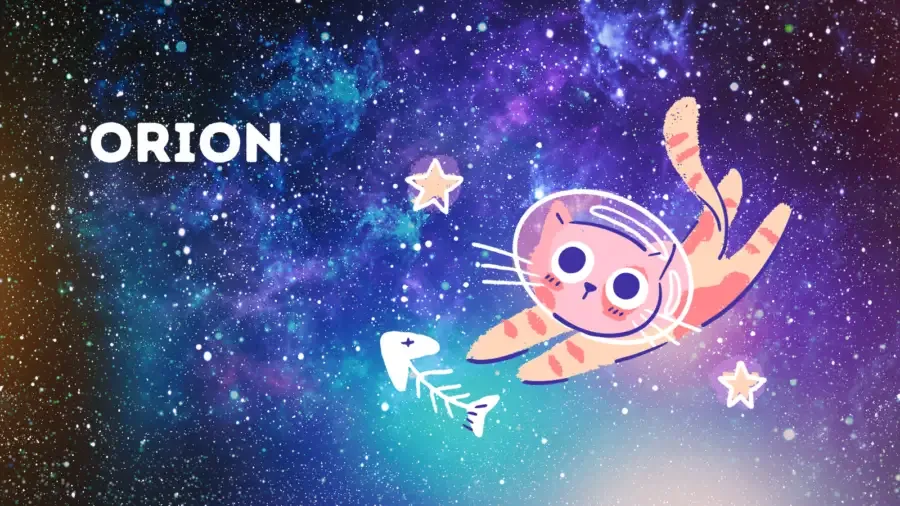
- Orion – A prominent constellation named after a hunter in Greek mythology.
- Perseus – A constellation, named after a Greek hero.
- Phoenix – A constellation and mythical bird reborn from its ashes.
- Pluto – A dwarf planet; Roman god of the underworld
- Polaris – The North Star
- Rigel – A bright star in the Orion constellation
- Rocket – A vehicle designed to propel itself through space
- Saturn – The sixth planet from the sun; Roman god of agriculture
- Sirius – The “dog star,” the brightest star in the sky, part of the Canis Major constellation.
- Sol – Latin for “sun”
- Spike – A sudden, large, and short-lived increase in quantity; reminiscent of meteor spikes
- Starling – A play on the word “star”
- Stellan – Related to “stellar,” meaning “like a star”
- Sterling – Meaning “little star”
- Taurus – A constellation and zodiac sign.
- Uranus – The seventh planet from the sun
- Vulcan – Mythical planet once believed to exist between Mercury and the Sun; Roman god of fire
- Zenith – The point in the sky directly above an observer
Unisex:
- Apex – The point in the sky towards which we are moving because of the Sun’s motion around the galaxy. It symbolizes forward motion and could be a unique name for a cat with a pioneering spirit.
- Asteroid – A small rocky body orbiting the sun. It could be a playful and solid name for a robust and energetic cat.
- Aquila – Latin origin meaning “eagle,” a constellation.
- Binary – Often refers to binary star systems where two stars orbit around a common center.
- Comet – A celestial object consisting of a nucleus of ice and dust. It might suit a cat with a swift and radiant personality.
- Caelum – Latin origin meaning “chisel,” a constellation.
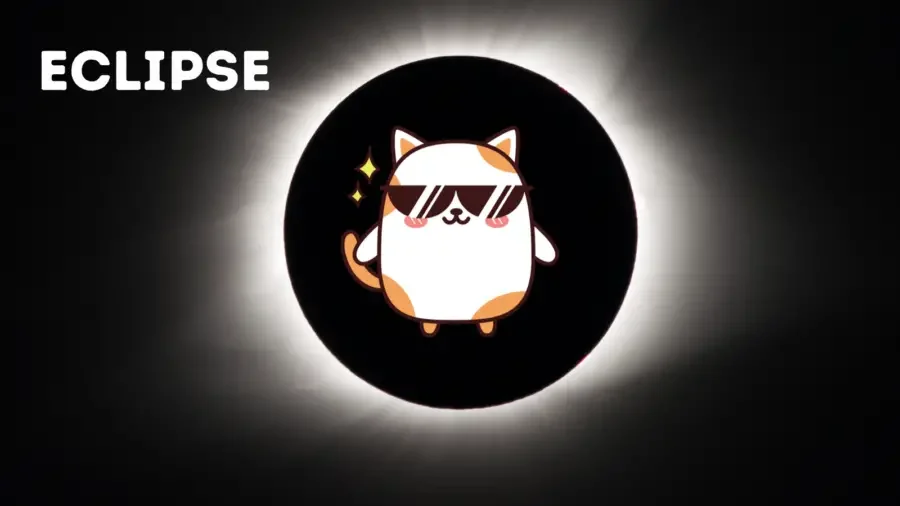
- Eclipse – The phenomenon where one heavenly body moves into the shadow of another. It could be a mysterious and captivating name for a cat with a dark and beautiful coat.
- Equinox – The time or date at which the sun crosses the celestial equator. It represents balance and could be a great name for a cat with a calm and balanced nature.
- Halley – As in Halley’s comet.
- Meteor – A small celestial body that enters the Earth’s atmosphere and burns up, often seen as a shooting star. This name might suit a swift and fiery cat.
- Nebula – A cloud of gas and dust in outer space, visible in the night sky either as an indistinct bright patch or as a dark silhouette. This could be a dreamy and mysterious name for a cat with an ethereal presence.
- Orbit – The curved path of a celestial object around a star or planet.
- Pulsar – A highly magnetized, rotating neutron star that emits beams of electromagnetic radiation. This name could suit a cat with a strong and magnetic personality.
- Quasar – An extremely luminous active galactic nucleus, powered by a supermassive black hole. It would be a fitting name for a cat with a bright and intense personality.
- Rigel – The brightest star in the constellation Orion, Arabic for “foot.”
- Solstice – Either of the two times in the year when the sun reaches its highest or lowest point in the sky. It could be a radiant name for a cat born around the time of a solstice.
Galaxy and Constellation Names
Each of these names has been inspired by the vastness and beauty of the universe, making them ideal choices for feline companions with an otherworldly charm.
- Andromeda – Named after the Andromeda Galaxy, the nearest spiral galaxy to the Milky Way.
- Antlia – Named after the Antlia Dwarf galaxy.
- Aquila – A constellation name which means “eagle” in Latin.
- Aries – Another constellation name, representing the ram.
- Cassiopeia – A northern constellation named after the vain queen from Greek mythology.
- Cepheus – A constellation named after the king of Ethiopia in Greek mythology.
- Comet – Inspired by the celestial objects made of ice and dust that orbit the sun.
- Cosmo – Short for “cosmos,” representing the universe.
- Gemini – A constellation representing the twins from Greek mythology.
- Lunar – Relating to the moon.
- Lyra – A small constellation named after the lyre, a musical instrument.
- Meteor – Inspired by the meteoroids that enter the Earth’s atmosphere and vaporize.
- Milky – After the Milky Way, our home galaxy.
- Nebula – Clouds of gas and dust in space, often as a result of a supernova explosion.
- Nova – A star showing a sudden large increase in brightness.
- Orion – A prominent constellation named after the hunter in Greek mythology.
- Pegasus – A constellation named after the winged horse in Greek mythology.
- Phoenix – A minor southern constellation named after the mythical bird.
- Pulsar – A highly magnetized rotating neutron star.
- Quasar – Extremely bright and distant point-like sources of energy.
- Sirius – The brightest star in the night sky, part of the Canis Major constellation.
- Solar – Relating to the sun.
- Stellar – Another word for starlike.
- Taurus – A constellation representing the bull from Greek mythology.
- Ursa – As in Ursa Major (Big Bear) and Ursa Minor (Little Bear), two prominent constellations.
- Vega – The brightest star in the Lyra constellation.
Space Names from Literature and Movies
Even space-set movies and TV shows that don’t feature cats can provide plenty of ideas for unique names for your cat:
- Arrakis – The desert planet from Frank Herbert’s Dune.
- Asgard – A location in space from the Marvel Universe, home of Thor.
- Avatar – The name of James Cameron’s film set on the planet Pandora.
- Babylon 5 – A space station from the eponymous TV series.
- Battlestar Galactica – A spaceship from the TV series of the same name.
- Bespin – A gas giant from Star Wars known for Cloud City.
- Coruscant – The central hub planet in the Star Wars universe.
- Cybertron – Home planet of the Transformers.
- Endor – The forest moon in Star Wars.
- Ender – The main character from Orson Scott Card’s Ender’s Game.
- Event Horizon – A ship from the film of the same name.
- Fhloston Paradise – A luxury cruiser in The Fifth Element.
- Foundation – A series and a location by Isaac Asimov.
- Hoth – The ice planet from Star Wars.
- Interstellar – A film by Christopher Nolan about traveling through a wormhole.
- Krypton – Superman’s home planet.
- Melancholia – A rogue planet from the movie of the same name.
- Metropolis – The city in space from the anime film Metropolis.
- Naboo – A planet from the Star Wars prequels.
- Narnia – Though not space-themed, it is a different world reached through magical means in C.S. Lewis’ Chronicles of Narnia.
- Necromonger – An empire in the Chronicles of Riddick series.
- Nostromo – The spaceship from Ridley Scott’s Alien.
- Pandora – The alien planet in James Cameron’s Avatar.
- Prometheus – A spaceship from the film of the same name, set in the Alien universe.
- Serenity – The spaceship from the TV series Firefly and its follow-up movie.
- Solaris – A sentient planet from the novel by Stanisław Lem and subsequent films.
- TARDIS – The Doctor’s time machine and spaceship from Doctor Who.
- Tatooine – A desert planet from Star Wars.
- The Enterprise – The starship from Star Trek.
- Trantor – The central planet in Isaac Asimov’s Foundation series.
- Vogon – An alien species from Douglas Adams’ The Hitchhiker’s Guide to the Galaxy.
- Vulcan – Spock’s home planet in Star Trek.
Celestial Cat Names
Would one of these planets, moons, and other celestial bodies inspire the name of your new cat?
- Ariel – A moon of Uranus.
- Atlas – A moon of Saturn.
- Callisto – A moon of Jupiter.
- Ceres – The largest object in the asteroid belt.
- Charon – The largest moon of Pluto.
- Deimos – A moon of Mars.
- Dione – A moon of Saturn.
- Elara – A moon of Jupiter.
- Enceladus – A moon of Saturn with potential underground oceans.
- Eris – A dwarf planet in the Kuiper Belt.
- Europa – A moon of Jupiter with potential sub-surface oceans.
- Ganymede – The largest moon in our solar system, orbiting Jupiter.
- Haumea – A dwarf planet in the Kuiper Belt.
- Hyperion – A moon of Saturn.
- Iapetus – A moon of Saturn.
- Io – A volcanic moon of Jupiter.
- Janus – A moon of Saturn.
- Juno – An asteroid.
- Jupiter – The largest planet in our solar system.
- Larissa – A moon of Neptune.
- Makemake – A dwarf planet in the Kuiper Belt.
- Mars – The red planet.
- Mercury – The closest planet to the sun.
- Mimas – A moon of Saturn.
- Miranda – A moon of Uranus.
- Neptune – The farthest planet in our solar system.
- Nix – A moon of Pluto.
- Oberon – A moon of Uranus.
- Pallas – An asteroid.
- Pandora – A moon of Saturn.
- Phobos – A moon of Mars.
- Pluto – A dwarf planet.
- Polaris – The North Star.
- Prometheus – A moon of Saturn.
- Proteus – A moon of Neptune.
- Rhea – A moon of Saturn.
- Saturn – The ringed planet.
- Styx – A moon of Pluto.
- Tethys – A moon of Saturn.
- Thalassa – A moon of Neptune.
- Titan – A moon of Saturn with a thick atmosphere.
- Titania – A moon of Uranus.
- Triton – A moon of Neptune.
- Umbriel – A moon of Uranus.
- Uranus – A gas giant with a unique tilt.
- Venus – The second planet from the Sun, also known as the “Evening Star” or “Morning Star.”
- Vesta – One of the largest objects in the asteroid belt.
- Voyager – A space probe.
- Vulcan – A hypothetical planet once believed to exist inside the orbit of Mercury.
- Xena – The provisional name once used for Eris.
- Ymir – A moon of Saturn.
Galaxy Names for Cats
- Andromeda – Named after the princess Andromeda in Greek mythology, it’s the nearest spiral galaxy to the Milky Way.
- Centaurus A – A prominent galaxy in the constellation of Centaurus, it is noted for having a very active center and is a strong source of radio emissions. A name fitting for a cat with a bold and active personality.
- Coma Berenices – Named after Queen Berenice II of Egypt, this galaxy is part of a cluster of galaxies in the constellation bearing the same name. It’s a perfect name for a royal and majestic cat.
- Orion – Named after the prominent hunter in Greek mythology, this is a large and bright galaxy, known for the Orion Nebula, a fitting name for a cat with a bold and adventurous spirit–or one who loves to hunt.
- Pegasus – This galaxy, named after the winged horse in Greek mythology, is an elegant name for a cat with a graceful demeanor.
- Phoenix – A galaxy located within the constellation of the same name, inspired by the mythical bird that rises from its ashes, making it a poetic name for a cat with a resilient spirit.
- Triangulum – This member of the local group of galaxies is named after the constellation it is found in, characterized by its triangular shape. It’s a fitting name for a three-legged cat.
- Ursa – Name your new cat for Ursa Minor, a galaxy named after the smaller bear constellation, it embodies the qualities of both gentleness and strength, making it a heartwarming name for a loving and protective cat.
- Virgo – This galaxy is part of the Virgo cluster, named after the constellation depicting a maiden. It symbolizes purity and grace, making it an ideal name for a cat with a gentle and calm disposition.
Famous Astronomers
These astronomers have made significant contributions to our understanding of the cosmos, and their names can be a fitting tribute for curious feline companions with a penchant for gazing up at the night sky.
- Annie – After Annie Jump Cannon, who classified hundreds of thousands of stars.
- Brahe – After Tycho Brahe, a Danish astronomer known for his comprehensive astronomical observations.
- Copernicus – After Nicolaus Copernicus, who formulated a heliocentric model of the universe.
- Drake – After Frank Drake, who’s known for the Drake Equation estimating the number of communicative civilizations in the cosmos.
- Edwin – After Edwin Hubble, for whom the Hubble Space Telescope is named. He showed that the universe is expanding.
- Einstein – Although primarily a physicist, Albert Einstein revolutionized the way we understand gravity and its role in the cosmos.
- Fleming – After Williamina Fleming, known for her discovery of the Horsehead Nebula.
- Galileo – After Galileo Galilei, the “father of observational astronomy.”
- Halley – After Edmond Halley, who determined the orbit of Halley’s Comet.
- Herschel – After Sir William Herschel, who discovered Uranus and infrared radiation.
- Hoyle – After Fred Hoyle, an English astronomer known for the theory of stellar nucleosynthesis.
- Jocelyn – After Jocelyn Bell Burnell, who co-discovered the first radio pulsars.
- Kepler – After Johannes Kepler, known for Kepler’s laws of planetary motion.
- Leavitt – After Henrietta Swan Leavitt, who discovered the relation between the luminosity and the period of Cepheid variable stars.
- Mitchell – After Maria Mitchell, the first American female astronomer, who discovered a comet.
- Newton – After Sir Isaac Newton, who made significant contributions to optics and gravitation.
- Sagan – After Carl Sagan, an American astronomer known for popularizing science and his research on extraterrestrial life.
- Shoemaker – After Eugene Shoemaker, who co-discovered the Comet Shoemaker–Levy 9.
- Vera – After Vera Rubin, who provided evidence for the existence of dark matter.
More Cat Names You Might Like
280 African Cat Names Rooted in the Wild and Wonderful
275 Alcohol Cat Names for Your Spirited Kitty
108 Gremlin Cat Names: From Mayhem to Movies
Pin it to remember
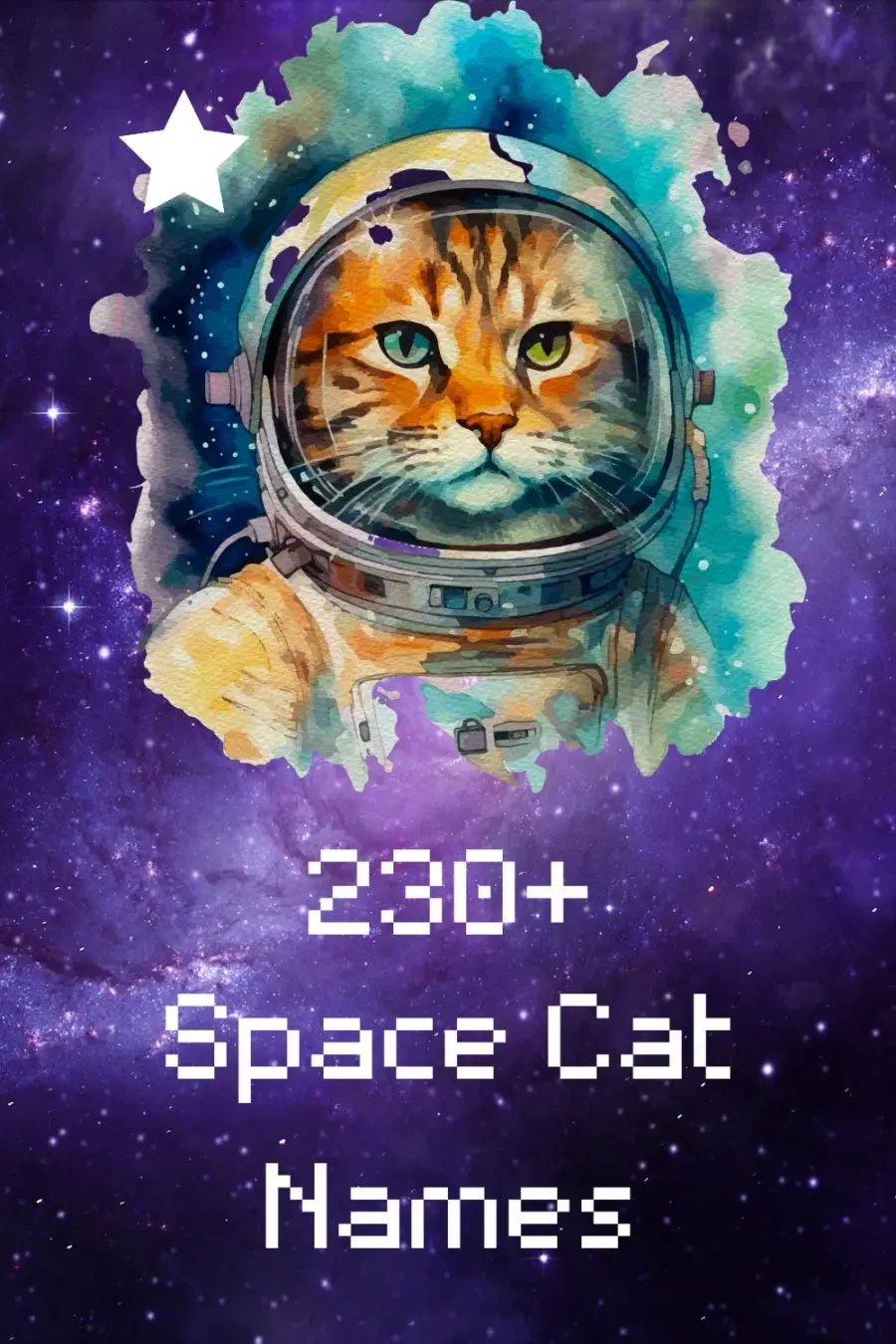
- 🎉 GIVEAWAY: Lord of the Pets Portrait of Your Cat! - November 26, 2024
- Review: Lord of the Pets Cat Portraits! - November 26, 2024
- Cat Adoption: FAQ You Might Have - June 28, 2024
